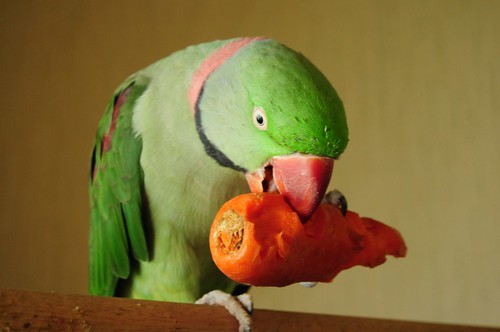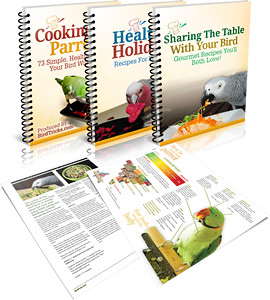
Q: I have had a problem with my macaw lunging at me since I got her 4 years ago. I recently switched her onto a better diet and the lunging has stopped. Is it possible that the new diet is responsible for the change in her personality?
A: It’s not only possible, it is probable.
There isn’t any area of your bird’s life that isn’t touched by its diet. Aside from being the largest contributing factor in your bird’s overall physical health, it comes as a huge surprise to most people to learn that their bird’s cranky disposition and unwillingness to socialize can be a result of improper diet.
It’s true. Your bird’s feistiness or disinterest in you, biting and/or screaming could all be clues that your bird’s diet is inadequate. The impact of diet on breeding behaviors has been widely recognized for years and, more recently, people are considering the effect diet has on all parrot behavior.
Consider how different foods make you feel after eating them. Certain foods might make you feel sluggish and others can bring about bursts of restlessness and nervousness.
The parrot that is on a high fat diet of nuts and seed who doesn’t have the means to expend that excess energy might become edgy and unpredictable.
These foods might also interfere with normal sleep cycles, effecting behavior further. The lethargic parrot will be less likely to willingly interact.
Eventually, though, a poor diet will be more than just the disruptive cause of highs and lows in mood and energy. Actual illness will set in having a devastating effect on the body’s different systems including the liver, kidneys and heart.

When you stop to think about it for a moment, it makes perfect sense that behavior is tied into diet. When we don’t feel well, we respond to others in one of two ways: we lash out impatiently or we withdraw, preferring solitude. You might initially start out feeling a little tired and irritable, but as your health declines, your behavior will certainly change for the worse. You can expect the same from your parrot.
Parrots are outgoing, gregarious and social creatures. By nature, they want to interact and have a peaceful and trusting relationship with their human flock mates. To be constantly on the defensive requires a lot of energy expenditure, and to separate from “their flock” goes against the safety protocols a parrot has in place innately.

Parrot Diet and Behavior Are Connected!
If your parrot is either aggressive or withdrawn, something is wrong. Yes, it might be nothing more than behavioral in origin, such as the emotional result of bad experiences with humans. But before you can deal with behavioral issues you must always first rule out medical possibilities for aberant behavior.
If illness is present, you will have to consider the part that diet has played in causing it and move forward with an improved diet. If the illness is unrelated to diet, you must ask yourself what part diet will play in the cure.
If there are no overt medical reasons justifying behavioral issues, you have to take into consideration how the current diet might be affecting mood and make the appropriate changes. In short, there is simply no way to avoid the impact of diet in your parrot’s life.
Are you seeing any of these behaviors in your bird?
- biting or lunging without provocation
- pacing nervously in the cage
- unwilling to interact with the flock or family
These could all be caused by the foods you are feeding your bird. Proper parrot diet is a simple and inexpensive solution to some problems that were formerly assumed to be behavioral.
The Good Parrot Diet Right At Your Fingertips!
What isn’t as easy is knowing how and what to feed your parrot. We put together a cookbook that is a step-by-step guide to parrot nutrition which details a simple and natural feeding system for the time-pressed parrot owner. It includes over 100 additional recipes that are quick and easy to make, and have been bird tested and veterinarian approved!
Cooking for Parrots virtually eliminates all the excuses we humans can come up with for not feeding our parrots well every day. It even shows you how to overcome the objections your parrot might have to a new, healthier diet, which means they won’t have any excuses either!
With good health comes more predictable and desirable parrots behavior – something that both you and your bird will benefit from!

Cooking For Parrots nutrition course
Author Patty Jourgensen specializes in avian health, behavior and nutrition and has been working with and caring for rescue birds since 1987.



2 comments
The more I read your blogs, the more I observe me Senegal and the more I become aware of what I feed her, the more I see how the two are interrelated. Thank you for all the great sensible knowlege and advice you post, Patty. I love my little “green monster” (lol) so very much and will take all the advice I can find. If I have to live to be 110, I plan to keep her as healthy and happy as I can.
Hi Patty, I hear about this happening SO MUCH on parrot forums I frequent. A lethargic, biting, territorial, non-playful, and antisocial parrot on a mostly seed/pellet/unhealthy foods can have such an amazingly different (and better!) attitude after it gets better nutrition!
Leave a comment